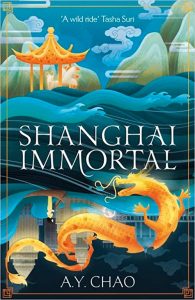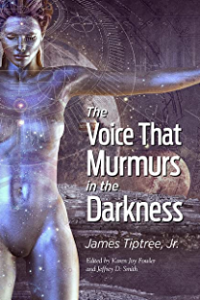Archita Mittra Reviews Shanghai Immortal by A.Y. Chao
 Shanghai Immortal, A.Y. Chao (Hodderscape 978-1-399-71741-0, £18.99, 352pp, hc) June 2023.
Shanghai Immortal, A.Y. Chao (Hodderscape 978-1-399-71741-0, £18.99, 352pp, hc) June 2023.
Shanghai Immortal by A.Y. Chao’s is a flamboyant debut fantasy novel featuring deities and demons from the Chinese pantheon that follows the escapades of Lady Jing – a half-vampire and half-hulijing fox spirit – as she traverses through the realms of Hell, 1930s Shanghai, and the Celestial lands. Vaguely reminiscent of Silvia Moreno-Garcia’s Gods of Jade and Shadow, this novel is a glitzy, fast-paced, and fun-filled joyride, focusing on Jing’s journey from selfishness to self-assertion, even as she foils the plans of scheming family members and finds an unexpectedly tender romance with Tony Lee, a human.
Jing, in crisp first-person narration, introduces herself as “a degenerate mix of unfortunate genes and circumstances.” She’s snarky, bittersweet, and irreverent in a way that immediately endeared her to me, as she recalls the sob story of how her late mother pawned her to Yan Luo Wang, the King of Hell, to clear her shopping debts. The story begins with Jing bringing a package at 3:00 a.m. (this turns out to be the mortal man) to Big Wang when she overhears some courtiers plotting to steal a mystical dragon pearl that was given to Wang as a condition for “buying” Jing. Despite being repeatedly told otherwise, Jing considers herself to be no better than an “indentured servant” to Wang and bitterly detests both the mollycoddling and responsibilities thrust upon her. Meanwhile, the Ivy League-educated Mr. Lee, we learn, has been tasked by Wang with building the Central Bank of Hell.
So, right from the outset, we have a protagonist immensely uncomfortable with and critical of the patriarchal restrictions placed upon her that determine how she’s expected to behave and what kind of clothes she’s allowed to wear. So unsurprisingly, Jing is rather foul-mouthed and has little regard for decorum or modesty, often ending up besmirching her family’s name by disrespecting elderly royalty, particularly Lady Soo, who continues to be a thorn in her side. To keep her safe and also to teach her a lesson, Wang sends Jing off to mortal Shanghai, accompanied by Lee. Jing uses this as an opportunity to investigate certain discrepancies and gather intel about the supposed heist, but it also gives her the freedom she longs for – she can now go partying, sip cocktails and even witness the beauty of a sunset for the first time in almost a century of her immortal life. Yet, as her feelings for Lee deepen, she’s pulled back to the Celestial lands, where she must overcome her past trauma and face the enemies within her family.
As a South Asian myself, I particularly enjoyed the way Chao captures complex Brown family dynamics – such as the curfews, clothing restrictions, and the chaperoning that Jing faces and prioritization of family traditions over individual agency. There aren’t any rigid “right” or “wrong” answers, and Jing must learn to negotiate with her family situation in her own unique way. Moreover, as a hybrid creature, Jing’s struggles to fit in are also a metaphor for the immigrant experience; initially, she comes off as petulant and spoilt, throwing a lot of tantrums and with no interest in her inherited title, but as the various events unfold, she’s slowly able to rebuild her self-worth, make new friends and stand up to the evil within her family without entirely disinheriting her mixed heritage. Towards the end, the machinations get rather chaotic, but Jing’s transformation and emotional growth is truly delightful to read.
The immersive settings are easily the best aspect of this novel. There’s a lot of wonderful world building going on behind the scenes, be it the evocative details on an article of clothing, the very dazzling descriptions of each venue that the characters visit, or the cameo appearances by various Chinese deities. The middle portion of this book where the friendship and love between Jing and Lee bloom, has a lovely, cozy, slice-of-life feel to it which I wished had gone on for a bit longer. As Chao’s romantic interest, Lee comes off as a very gentle, soft-spoken, and cute mortal, although his arc could have been more developed (but that’s excusable, given that this is primarily Jing’s coming-of-age tale). Overall, despite being marketed as an “adult” fantasy, the novel seems tonally more geared towards YA readers, relishing in its relatively low stakes and comedic situations.
Vividly imagined and packed with family drama and a charming romance, Shanghai Immortal is a light and entertaining read, assuring us that A.Y. Chao is here to stay.
Archita Mittra is a writer and artist, with a fondness for dark and fantastical things She completed her B.A (2018) and M.A (2020) in English Literature from Jadavpur University and a Diploma in Multimedia and Animation from St. Xavier’s College.
When she isn’t writing speculative fiction or drawing fanart, she can be found playing indie games, making jewelry out of recycled material, reading a dark fantasy novel, baking cakes, or deciding which new Tarot deck to buy.
She lives in Kolkata, India, with her family and rabbits.
This review and more like it in the September 2023 issue of Locus.
 While you are here, please take a moment to support Locus with a one-time or recurring donation. We rely on reader donations to keep the magazine and site going, and would like to keep the site paywall free, but WE NEED YOUR FINANCIAL SUPPORT to continue quality coverage of the science fiction and fantasy field.
While you are here, please take a moment to support Locus with a one-time or recurring donation. We rely on reader donations to keep the magazine and site going, and would like to keep the site paywall free, but WE NEED YOUR FINANCIAL SUPPORT to continue quality coverage of the science fiction and fantasy field.
©Locus Magazine. Copyrighted material may not be republished without permission of LSFF.








